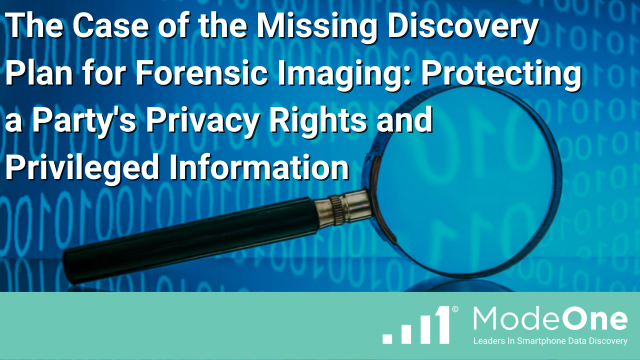Partners Insight, LLC v. Gill, 2023 WL 2864375 (M.D. Fla. Apr. 10, 2023)
In an action alleging the misappropriation of trade secrets following a separation of employment, the plaintiffs, Partners Insight and Gulf Coast Optometry, moved to compel a forensic examination of the defendants’, Jennifer and Steven Gill, cell phones, computers, and other electronic storage devices. The defendants objected because the devices included confidential personal and business information, proprietary information, and trade secrets. Although the defendants prevailed, the process was more challenging and frustrating than it needed to be.
Magistrate Judge Kyle Dudek first discussed the scope of discovery for electronically stored information (ESI) and forensic examinations in federal court, where the parties may obtain discovery on any unprivileged matter relevant to any party’s claim or defense that is proportional to the needs of the case. Fed. R. Civ. P. 26(b)(1). Next, Judge Dudek discussed whether a forensic image was called for in discovery in the U.S. District Court for the Middle District of Florida, where the court must weigh the “utility of the proposed examination against inherent privacy concerns.” Bradfield v. Mid-Continent Cas. Co., 2014 WL 4626864, at *4 (M.D. Fla. Sept. 15, 2014). Furthermore, “Mere speculation that electronic discovery must exist is insufficient to permit forensic examination of a party’s personal computer or cellphone.” Garret v. Univ. Of S. Fla. Bd. Of Trustees, 2018 WL 4383054 at *2 (M.D. Fla. Sept. 14, 2018).
Aside from the case law, The Middle District of Florida’s Civil Discovery Handbook also covers the ground: “Inspection of an opponent’s computer system is the exception, not the rule.” And that someone should only seek the creation of forensic image backups of computers “in exceptional circumstances which warrant the burden and cost.” Furthermore, “A request to image an opponent’s computer should include a proposal for the protection of privacy rights, protection of privileged information, and the need to separate and ignore non-relevant information.”
In this case, plaintiffs did not satisfy the requirements specified in the discovery handbook. There was no proposal to protect privacy rights or privileged information. Judge Dudeck could have decided the matter on this ground. But as in many similar matters, more was happening here.
The plaintiffs failed to first ask the defendants to voluntarily produce discovery on the information they ultimately sought through forensic imaging of the defendants’ electronics. Even then, plaintiffs acted on the “information and belief” that defendants transferred confidential files to their devices. According to Garret, the mere speculation was insufficient to call for full forensic imaging. Finally, the plaintiffs did not name the expert who would conduct the forensic imaging and placed an additional burden on the defendants to submit a list of negative search terms to avoid uncovering private or privileged information.
Had counsel for the plaintiffs been aware of ModeOne’s patented remote, automated smartphone data collection technology, they could have proposed a plan to protect the defendants’ privacy rights and privileged information. ModeOne’s revolutionary solution features a software-as-a-service (SaaS) framework that empowers users to target and collect only the information responsive to litigation, compliance initiatives, or investigations. It helps legal professionals manage case facts and quickly obtain and analyze vital evidence stored on smartphones and short-message chat applications using an automated, defensible, secure, and cost-certain workflow.
Hat tip to Sidley Austin LLP for bringing this case to our attention in its Insights, E-Discovery Update on July’s Notable Cases and Events in E-Discovery.
Credit: Partners Insight, LLC v. Gill link by Casetext.
